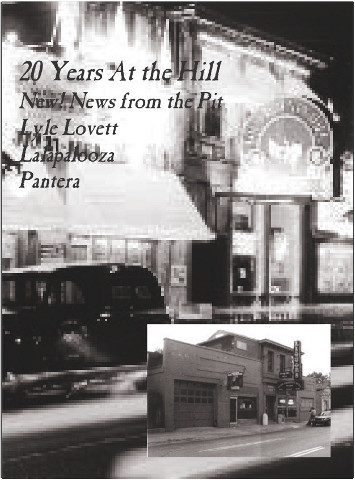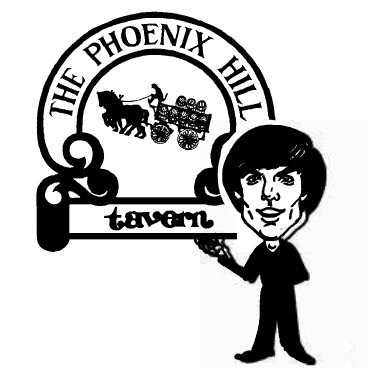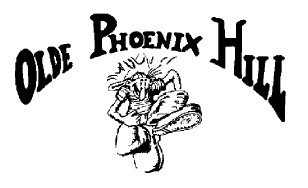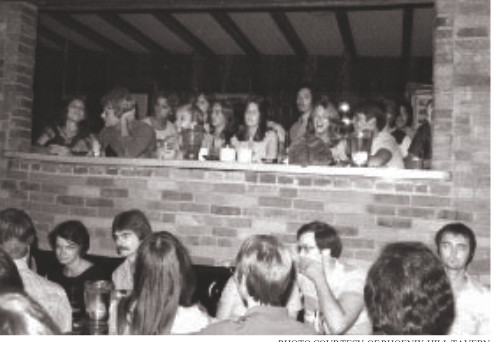

For Louisvillians of several certain ages, the Phoenix Hill tavern has been the place to go to meet new people, to drink, to listen to hot new bands and old favorites, to wander through and admie the antiques and collectibles.
For others, it's been a place to avoid.
But there is no ignoring its presence, even its dominance, in the Louisville night life scene for the last twenty years.
Louisville Music News looks back on twenty years at the Hill and relates a few good stories.
Frankie Gray likes her job, even though it means sleeping days and being around loud music all night.
"I don't always hear the music, though," Gray explained. "I'm too busy watching the crowd, checking to make sure everything is okay.

As Operations Manager at the Phoenix Hill Tavern, Gray is in charge of making it all work, night after night. Make sure there are enough servers, that the band gets what it needs, that the beer is cold and the action is hot.
Well, okay, she doesn't make sure the action is hot.
"It's a singles bar, sure," Gray said, "but we're mostly in the business of providing entertainment. We want to make sure that everyone has a good time and feels safe."
From the beginning, the Phoenix Hill has posted a sign in the women's rooms, informing any female patron that she need only ask at the bar and she could get an escort to her car. That, combined with a large security staff, has served to make the club popular with single women, who feel safe going to Phoenix Hill Tavern. Of course, where there are single women, there are men.
If people feel comfortable and secure, Gray explained, then they'll come back and that's what makes the Phoenix Hill work.
"Repeat business. We live on repeat business. People think the Phoenix is their bar. They bring their friends in and show them around the place," as though it was their house, she elaborated.
"My father brings his friends here now," she said. She went on to explain that when she first started at the club, she hesitated to tell her father, a former military man, that she was working at a bar.
He accepted the idea finally.

A twelve-year veteran at the Hill, Frankie, as everyone calls her, worked her way up from her first job as a waitress.
"When I first got here, I couldn't believe that people could have worked here as long as Karen (Shane, a longtime Phoenix Hill Tavern employee). Now I can't believe I've been here this long."
Benny Rogers' parents gave him a liquor license for his 21st birthday. With that, plus some family assistance with securing the many antiques and collectibles that decorate virtually every wall and ceiling in the club, he set about to create what has been called a night life theme park in the 100-year-old building.
Originally built by contractor Matthew Oeffinger in 1884 and used in his lumber business, the building became a saloon a year later, when he opened a drinking establishment on the ground floor and lived upstairs.
The structure changed hands several times around the turn of the century and by 1920, the building was in use by the Highland Motor Company to house and repair heavy construction equipment engines. The ceiling of the garage was a concrete and steel deck, set on steel trusses to support the monorail that was used to lift and move the engines around the room. This structure remained, ultimately to provide the support for various expansions to the Phoenix Hill Tavern.
The Phoenix Hill Tavern opened in August 1976, with fifty seats in what is now the Taproom, over a liquor store on the ground floor. By 1977, heavy demand led to the building of the Roof Garden and three years later, Rogers had the Saloon opened. It featured a 70-foot bar with stations for seven bartenders, a hand-carved Honduran mahogany back bar built by Brunswick and room for 400 revelers. The giant ceiling fans came from the Schenley Distillery on 35th Street and the brass chandeliers from the now-demolished Watterson Hotel.

Several more additions and modifications have been undertaken. The Piano Parlor featured a restored player piano, which still sits in the room with the blackjack table. The Solarium, originally a passageway between the Taproom and the Roof Garden was expanded to include booths and glassed in to provide light for the many hanging plants. The Roof Garden got a removable canvas roof, making it an all-weather room for music. The Diner opened to provide patrons with sandwiches and snacks, then was renamed the Arcade and Eats, with video games and pool tables added.
The Deck Bar opened in 1994, filling the area between the Phoenix and Roppel Radiator, and adding yet a fourth performance space, as well as another bar.
The club has featured live music from theearliest days. In the beginning, small acoustic acts were the norm, but as the business grew, the size of the bands and the significance of the performers also grew. From Richie Havens to NewGrass Revival to Adrian Belew to Son Volt, the list of nationally known performers who have played at the Phoenix grows longer and longer every year.
Like many who work or come to the club, Gray had a list of her favorites shows
"Believe it or not," she said, "one of my very best memories was of the show Meatloaf put on. He was just incredible."
She also listed Black Uhuru, the Replacements and B. B. King as shows of considerable note.
The Phoenix Hill's dealings with local musicians has not always been the best, however. Many players are unhappy that the tavern does not pay musicians more and some will not play there at all for that reason. Longtime blues musician Winston Hardy expressed it this way, only half-joking: "You can say that Ben Rogers went to school with my wife and I hate him anyway. But really, I just wish he would pay musicians more, that's all."
When asked about the pay issue, Frankie Gray shrugged and said "None of us is paid as well as we want to be."
The club did help sponsor the recording of three vinyl albums, together with radio station WLRS, in 1982, '83 and '84. The club also has been a regular spot for many benefit concerts, particularly the series staged by the Musicians' Emergency Relief Fund (MERF).
The club now holds approximately 1,000 patrons, depending in part on the weather.
On August 27, 1986, the now-defunct Louisville Times ran a story about the Phoenix Hill Tavern. It ended with this quotation from Ben Rogers:
"It's just working beautifully now. I think that Phoenix Hill has gone through its roughest times. I think it can last another ten years."
From the looks of things, it seems likely that the Phoenix Hill Tavern will last ten more years again.